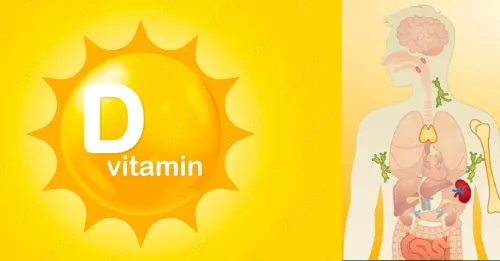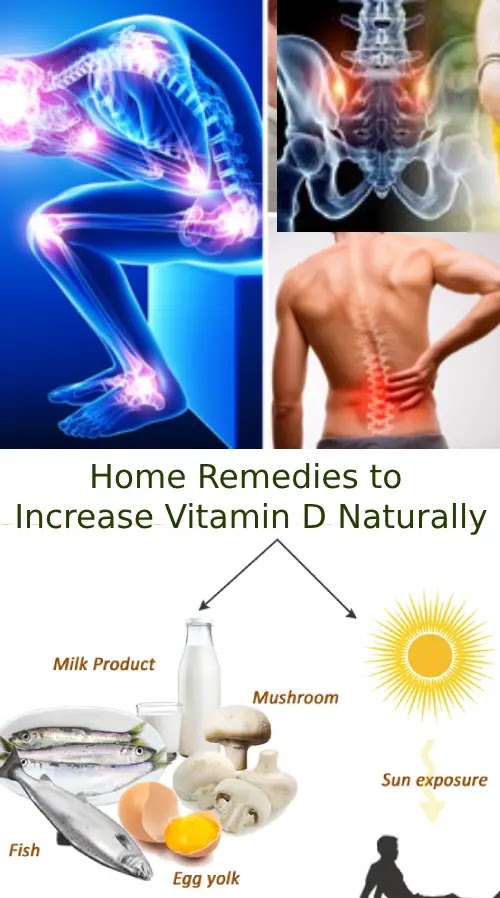Home Remedies to Increase Vitamin D Naturally: If you are experiencing a Vitamin D deficiency, there are natural remedies you can try at home to increase your levels. These remedies are simple and easy to follow, and you should start seeing results within a few days.
 |
| Home Remedies to Increase Vitamin D Naturally |
I have noticed that my body is not feeling as healthy as usual. I think it may be because I am not getting all the essential nutrients and vitamins in my diet. To keep my body functioning at its best. As a result, my body is becoming a home of disease. This problem is not unique to me, as many people are currently facing similar health issues. The body is losing important minerals and vitamins, with vitamin D deficiency being the most common. (Read This: What to Eat During Periods to Reduce Stomach Pain)
Vitamin D plays a crucial role in maintaining overall health. In this article, we will discuss the causes and symptoms of Vitamin D deficiency, as well as explore Home Remedies to Increase Vitamin D Naturally.
Vitamin D Deficiency
Vitamin D deficiency is a condition that occurs when the body doesn't receive enough of this essential nutrient. Vitamin D is critical for maintaining overall health and proper functioning, as it plays a vital role in supporting the immune system and keeping our bones healthy. It is also often referred to as the "sunshine vitamin" because we get enough vitamin D from sunlight. (Read This: Home Remedies to Cure Insomnia Quickly)
Causes of Vitamin D Deficiency:
- Inadequate Sunlight Exposure: Limited exposure to sunlight mainly causes lead to insufficient production of vitamin D in the skin. You spend less time outdoors, living in areas with limited sunlight, and wearing clothing that covers most of the skin.
- Diet: Vitamin D is found in certain foods. People with poor diets that lack foods rich in vitamin D may be at risk of deficiency.
- Malabsorption: Certain medical conditions affecting the digestive system, such as celiac disease, Crohn's disease, or cystic fibrosis, can interfere with the body's ability to absorb vitamin D from food.
- Obesity: Having a higher body fat percentage and obesity can lead to a deficiency in Vitamin D. This is often seen in individuals who are obese.
- Age: As people age, their skin becomes less efficient at producing vitamin D from sunlight.
- Kidney and Liver Disorders: If you have kidney or liver issues, you may experience difficulty converting vitamin D to its active form, which can result in a vitamin D deficiency.
Symptoms of Vitamin D Deficiency:
Symptoms of vitamin D deficiency may not always be noticeable, but some common signs and symptoms include:
- Fatigue and weakness
- Bone and joint pain
- Muscle pain and weakness
- Frequent infections or a Weakened immune system
- Depression or mood swings
- Impaired wound healing
- High Blood Pressure
- Excessive Sweating
- Constipation Problem
Home Remedies to Increase Vitamin D Naturally
 |
| Home Remedies to Increase Vitamin D Naturally |
To prevent Vitamin D deficiency and to increase the level of Vitamin D in your body, you can adopt these home remedies:
1. Sunlight:
Sunlight is the primary source of Vitamin D. Exposure to sunlight is a good natural remedy for vitamin D production. It delves into the process of how our skin synthesizes vitamin D when exposed to ultraviolet B (UVB) rays and provides guidelines on the optimal duration and time of day for safe sun exposure. 10-15 minutes daily expose yourself to sunlight to get vitamin D from the sun.
Read This: How to Reduce Cholesterol in 7 Days Naturally
2. Take Vitamin D Rich Foods:
To increase your intake of vitamin D, consider consuming foods that are naturally rich in this nutrient. Some excellent sources include fatty fish like salmon, egg yolks, cheese, and beef liver. Additionally, mushrooms, spinach, oranges, bananas, cottage cheese, yoghurt, tofu, and soy milk are all great sources of vitamin D. Incorporating these foods into your diet can help ensure that you are getting sufficient amounts of this important nutrient.
3. Healthy Lifestyle:
It is important to maintain a healthy lifestyle to ensure adequate levels of Vitamin D. Incorporating regular physical activity into your daily routine is essential. Getting at least 7-8 hours of sleep, practising meditation to manage stress, and avoiding habits such as smoking and excessive alcohol consumption can all impact your overall health and potentially affect your vitamin D metabolism.
Read This: My Healthy Lifestyle Tips: Simple Health Tips for Everyday
4. Supplements:
If you have difficulty getting enough vitamin D through sunlight and dietary sources, you can also take vitamin D supplements. Vitamin D3 supplements (cholecalciferol) are more potent and are commonly recommended.





0 Comments